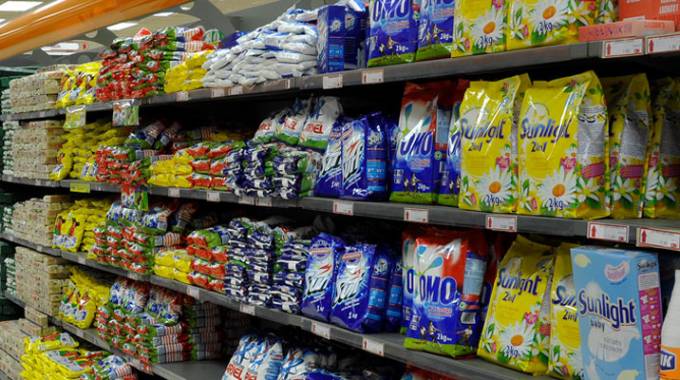
The Sunday Mail

Kuda Bwititi
Chief Reporter
Production of affordable basic commodities is now imminent after Government injected $70 million into Silo Foods to help the company ramp up production.
An additional US$95 million will be invested over a three-year period to make the project both viable and sustainable.
Silo Foods already begun operating as a fully fledged commercial business unit on April 1 this year after the Grain Marketing Board (GMB) was unbundled into two units, which also include a Strategic Grain Reserve.
Fuel prices have also dropped after Government increased the blending ratio of petrol with ethanol to 10 percent from five percent last week.
Industry regulator, the Zimbabwe Energy Regulatory Authority (Zera), has directed that effective tomorrow, the maximum pump price for diesel and petrol will be $3,21 and $3,35 per litre, respectively.
“Please note that these figures take into account the revised excise duty and represent maximum FOB (freight on board) and pump prices for different fuels. Operators may, however, sell, at prices below the cap depending on their trading advantages,” said Zera in a statement.
President Emmerson Mnangagwa recently indicated Government’s intention to improve the availability and affordability of basic commodities through the entity.
Silo Foods managing director Mr Daniel Maregedze told The Sunday Mail that the fresh capital injection would enable it to expand its operations “in a big way”.
“The Government has invested about $70 million in the company. This is fresh capital injection, which will enable us to scale up our operations immediately,” said Mr Maregedze.
“We have already been on the market, but now we are expanding our operations in a big way. On top of that, Treasury is finalising another package for capital equipment, estimated at US$55 million and $40 million over a three-year period. We started operating as a separate entity on 1 April. We are currently recruiting for key positions in order to capacitate the team to deliver on our mandate,” he said.
The company plans to use all 87 GMB depots as a conduit to distribute its products.
Wholesale and retail outlets that already stock the company’s brands will also be used.
It is envisaged that the refocused entity will become an arbiter in the market by providing affordable basic commodities that would compete with retailers, most of who are accused of extortionately and speculatively pricing their products.
With the new cash resources, Silo Foods, which is in the process of re-inventing itself as a major player in the agro-processing sector, is now ramping up production.
“We have production facilities in four locations so far: Belmont, Cleveland, Mutare and Norton Stock Feeds. We will be selling in every GMB depot (there are 87 of them). We have already set up 25 other Country Feeds shops around Zimbabwe. It is our stated intention to rapidly scale up on our production facilities,” said Mr Maregere.
Silo Foods, which has three business units – stock feeds, milling and prepacks as well as farming – is involved in the whole value chain.
The retailing function is mainly carried out through Country Feeds.
Pricing
Mr Maregere said the company didn’t have the appetite to profiteer and would ensure that it only makes “enough profit to keep the business going”.
As part of the ongoing expansion drive, the firm’s workforce will be increased from 50 permanent workers to 400 as new production facilities will be opened.
There are also plans to increase Silo Foods’ share of the mealie-meal market from 15 percent to 25 percent by year-end.
The expansion drive will be sustained over the next three years.
Speaking at the 39th Independence Day celebrations, President Mnangagwa said Silo Foods would provide relief to consumers.
“The setting up of Silo Foods company will further see increased availability and affordability of many basic commodities throughout the country,” he said.
Accordingly, Cabinet recently resolved to expedite the setting up of the company, saying it would “play a critical role in the economy.”
In fact, the recommendations that were made by Finance and Economic Development Minister Pro-fessor Mthuli Ncube to revitalise the entity were adopted at the March 26 Cabinet meeting.
Briefing journalists on the Ninth Cabinet decisions matrix, Information, Publicity and Broadcasting Ser-vices Minister Monica Mutsvangwa said:
“Taking into cognisance the critical role Silo Food Industries is set to play in the economy, Cabinet ap-proved the following: that the process of appointing the Silo Food Industries’ board be expedited to give necessary strategic guidance and oversight to the entity; that the funding proposals from poten-tial strategic partners for Silo Food Industries be submitted for consideration and approval by Govern-ment; and that Government’s minimum equity holding in Silo Food Industries be 26 percent.”
The expeditious restructure of GMB is in sync with the Public Enterprises Reform Framework (2018-2020), which is being driven through the Transitional Stabilisation Programme (TSP).
In turn, the TSP — which is a short-term blueprint — feeds into President Mnangagwa’s Vision 2030 to transform Zimbabwe into an upper middle- income economy.



